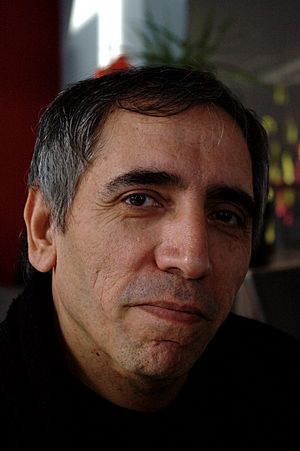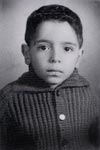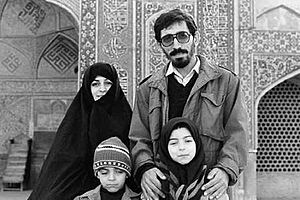Mohsen Makhmalbaf facts for kids
Quick facts for kids
Mohsen Makhmalbāf
|
|
|---|---|
| محسن مخملباف | |
 |
|
| Born | May 29, 1957 Tehran, Iran
|
| Nationality | Iranian |
| Years active | 1981–present |
| Political party | Mojahedin of the Islamic Revolution Organization (1979–1980s) |
| Spouse(s) | |
| Children | Samira Meysam Hana |
| Awards | Freedom to Create Prize Federico Fellini Honour |
Mohsen Makhmalbaf (Persian: محسن مخملباف, Mohsen Makhmalbaaf; born May 29, 1957) is an Iranian film director, writer, film editor, and producer. He has made over 20 feature films, won 50 awards, and been a juror in more than 15 major film festivals. His award-winning films include Kandahar; his latest documentary is The Gardener and latest feature The President.
Makhmalbaf's films have been widely presented at international film festivals in the past ten years. The director belongs to the new wave movement of Iranian cinema. Time selected Makhmalbaf's 2001 film Kandahar as one of the top 100 films of all time. In 2006, he was a member of the Jury at the Venice Film Festival.
Makhmalbaf left Iran in 2005 shortly after the election of Mahmoud Ahmadinejad, and has lived in Paris since the events of the 2009 Iranian presidential election.
Life
Makhmalbaf was born in Tehran on May 29, 1957. At the age of 15, he became involved in a militant group fighting against the rule of Mohammad Reza Pahlavi, the then Shah of Iran, and at the age of 17, he was imprisoned for stabbing a policeman and sentenced to death. After serving five years of his sentence, he was released in the wake of the Iranian Revolution. He left Iran in 2005.
Career
Makhmalbaf is a major figure in Iranian cinema. His films have explored the relationship between the individual and a larger social and political environment. As a result, his work serves as an extended commentary on the historical progression of the Iranian state and its people. Makhmalbaf has worked in several genres, from realist films to fantasy and surrealism, minimalism, and large frescoes of everyday life, with a preference (common to Iranian directors) for the themes of childhood and cinema.
In 1981, he wrote the screenplay for Towjeeh, directed by Manuchehr Haghaniparast. In 1982, he wrote the screenplay for Marg Deegari, directed by Mohammad-Reza Honarmand. He made his first film, Tobeh Nosuh, in 1983, and Boycott, a film set in pre-revolutionary Iran, in 1985. The latter tells the story of Valeh (Majid Majidi), a young man sentenced to death for Communist tendencies, and is widely believed to be based on Makhmalbaf's own experiences.
Makhmalbaf portrays human despair, exploitation, and resilience in The Cyclist (1987), a movie about Nasim, a poor Afghan refugee in Iran in desperate need of money for his ailing wife. Nasim agrees to ride a bicycle in a small circle for one week for the money he needs to pay his wife's medical bills.
In 1989, Iranian director Abbas Kiarostami read in the newspaper about an incident in which a Tehranian man named Hossain Sabzian tricked a family into believing he was Makhmalbaf. Kiarostami adapted the case into the 1990 docufiction film Close-Up, and recruited Makhmalbaf himself to appear in the final scene of the film. Close Up is now regarded as a masterpiece of world cinema and was voted by critics onto 2012's Sight and Sound list of The Top 50 Greatest Films of All Time.
Time of Love (1991) is Makhmalbaf's ninth feature film and the first film of what he calls his "third period". It is a romantic trilogy that offers three variations of the same story.

Makhmalbaf directed Gabbeh in 1996. The film follows the nomadic Ghashghai people, whose bright, bold carpets tell stories. The main thread features a young woman who loves a mysterious stranger but is forbidden to marry him. The film is romantic and non-realistic, with events seeming to leap around in time and space, much like a dream.
Makhmalbaf took time off from directing in 1996 to form the Makhmalbaf Film House, a school for young filmmakers. It quickly became a private production house for the increasing number of filmmakers in his family. In 1997, his 17-year-old daughter Samira directed The Apple, using him as a scriptwriter and editor. Makhmalbaf's wife, Marziyeh Meshkini, worked as an assistant director to her daughter and then took up directing herself.
Kandahar (2001) is a fictional odyssey inspired by a true story set in Afghanistan before the September 11 attacks, as the Taliban's laws strip women of civil rights and hope and a Western-cultured Afghan woman returns to prevent her sister's death during the last eclipse of the 20th century.
I witnessed about 20,000 men, women, and children around the city of Herat starving to death. They couldn't walk and were scattered on the ground awaiting the inevitable. This was the result of the recent famine. That same day the then United Nations High Commissioner for Refugees, Japan's Sadako Ogata, also visited these same people and promised that the world would help them. Three months later, I heard on Iranian radio that Madame Ogata gave the number of Afghans dying of hunger to a million nationwide.
I concluded that nobody demolished the statue of Buddha; it crumbled out of shame. Out of shame for the world's ignorance toward Afghanistan. It broke down, knowing its greatness didn't do any good.
– Limbs of no body : World's indifference to the Afghan tragedy, June 20, 2001
Early years of revolution
In contrast to his later career, for about a decade after the revolution, Makhmalbaf's views and films served as the voice of revolutionary art in the cultural atmosphere of Iran. Moreover, some pre-revolutionary filmmakers have accounts about celebrities who have been hurt by Makhmalbaf's positions in this period. Saeed Motalebi, an established writer and director before the revolution, is one of the people who has repeatedly recounted stories about how Makhmalbaf's stances affected pre-revolutionary stars. One of these accounts refers to the 1982 film The Imperilled (Barzakhi-ha) which was written by Motalebi and had four pre-revolutionary male stars in the lead roles. It was directed by Iraj Ghaderi and, with its patriotic story about resisting foreign invasion, it was a chance for Fardin, Malek-Motiei, Ghaderi and Rad to renew their threatened careers as actors in the post-revolutionary atmosphere. The film was a hit and became the highest grossing Iranian film of all time in its short period of screening in theaters. But it was soon banned and consequently the four actors were banned from working.
In later years, Makhmalbaf became deeply disillusioned, first by the Islamic regime, and soon after by Islamic ideology itself. By the early 1990s he was one of the most outspoken critics of the government in Iran.
Degrees and honors
- Mohsen Makhmalbaf: Selected as the best filmmaker after the revolution by readers of cinema publications, 1988
- A Moment of Innocence: Among Top Ten Films of the Decade – Awarded by International Festival Directors and Critics 1999
- "Federico Fellini Honor" from UNESCO in Paris, 2001 (France)
- "Freedom to Create Prize" for his human rights activity and promoting social justice through his art, Art Action, England, 2009
- Honorary Degree of Doctor of Cinema from Nanterre University, France, 2010
- Honorary Degree of Doctor of Literature from St Andrews University, Scotland, 2011
Filmography
| Year | English title | Original title | Length | Notes |
|---|---|---|---|---|
| 1983 | Pure Repentance | Tawba Nasuh | 100 minutes | |
| 1984 | Two Blind Eyes | Do Cheshme Bisoo | 102 minutes | |
| Seeking Refuge | Isti'azah | 89 minutes | ||
| 1986 | Boycott | Boycott | 95 minutes | |
| 1987 | The Peddler | Dastforoush | 90 minutes | |
| 1989 | The Cyclist | Bicycleran | 83 minutes | |
| Marriage of the Blessed | Arousi-ye Khouban | 70 minutes | ||
| 1990 | The Nights of Zayande-rood | Shabhaye Zayandeh-rood | 100 minutes/63 minutes (censored) | |
| 1991 | Time of Love | Nobat e Asheghi | 70 minutes | |
| 1992 | Once Upon a Time, Cinema | Nasseroddin Shah Actor-e Cinema | 92 minutes | |
| 1993 | Images from the Qajar Period | Tasvir Dar Doran-e Ghajar | 18 minutes | Short documentary |
| The Artist | Honarpisheh | 86 minutes | ||
| Stone and Glass | Sang-o-Shisheh | 20 minutes | Short documentary | |
| 1995 | Hello Cinema | Salaam Cinema | 81 minutes | Docudrama |
| 1996 | A Moment of Innocence | Nun va Goldoon | 78 minutes | |
| Gabbeh | 72 minutes | |||
| 1997 | The School the Wind Blew Away | Madrese-i ke bad bord | 8 minutes | Short |
| 1998 | The Silence | Sokout | 74 minutes | |
| 1999 | Tales of Kish | Ghessé hayé kish | 72 minutes | Segment The Door |
| 2000 | Tales of an Island | Dastanhaye Jazireh | 76 minutes | Segment Testing Democracy |
| 2001 | Kandahar | Safar-e Ghandehar | 85 minutes | |
| The Afghan Alphabet | Alefbay-e afghan | 46 minutes | Documentary | |
| 2005 | ... & Philosophy | ... o phalsapheh | 102 minutes | |
| 2006 | Scream of the Ants | Faryad moorcheha | 85 minutes | |
| The Chair | Sandali | 8 minutes | Short | |
| 2009 | The Man Who Came with the Snow | 75 minutes | Co-directed with Marzieh Meshkini | |
| 2012 | The Gardener | Bagheban | 87 minutes | Documentary |
| 2013 | The Endless Smile | Labkhande-bi-payan | 52 minutes | Documentary |
| 2014 | The President | 118 minutes | ||
| 2015 | The Tenant | 18 minutes | Short | |
| 2019 | Marghe and Her Mother | 101 minutes | Set in Italy |
Films banned in Iran
- The Nights of Zayande-rood (1990), banned since 1990
- Time of Love (1991), banned since 1991
- Once Upon a Time, Cinema (1992), banned from 1992 until 1993
- A Moment of Innocence (1996), banned from 1996 until 1997
- The Silence (1998), banned from 1998 until 2000
- The Gardener (2012), banned since 2012
Film appearances
- Marriage of the Blessed (1989), directed by himself
- Close-Up (1990), directed by Abbas Kiarostami
- Hello Cinema (1995), directed by himself
- A Moment of Innocence (1996), directed by himself
- Tales of an Island (2000), directed by himself and Dariush Mehrjui
See also
 In Spanish: Mohsen Makhmalbaf para niños
In Spanish: Mohsen Makhmalbaf para niños
- Cinema of Iran



